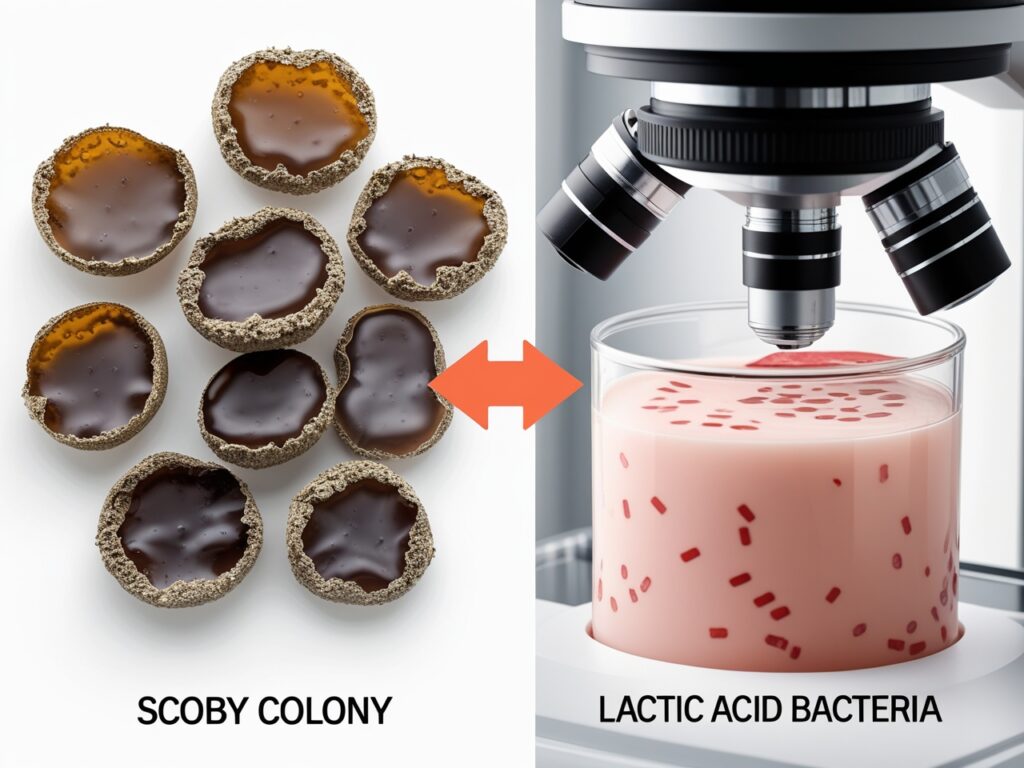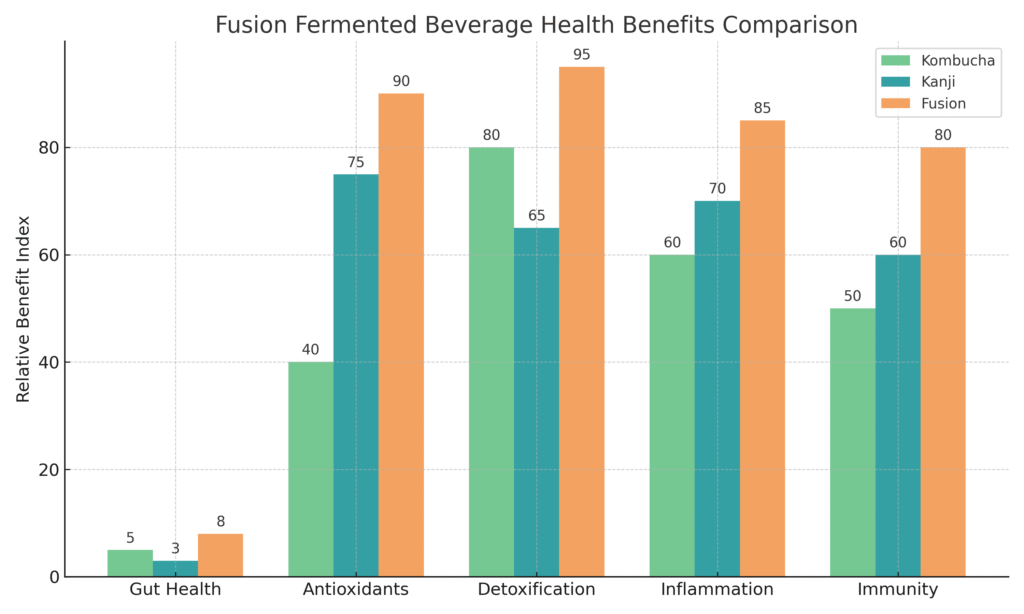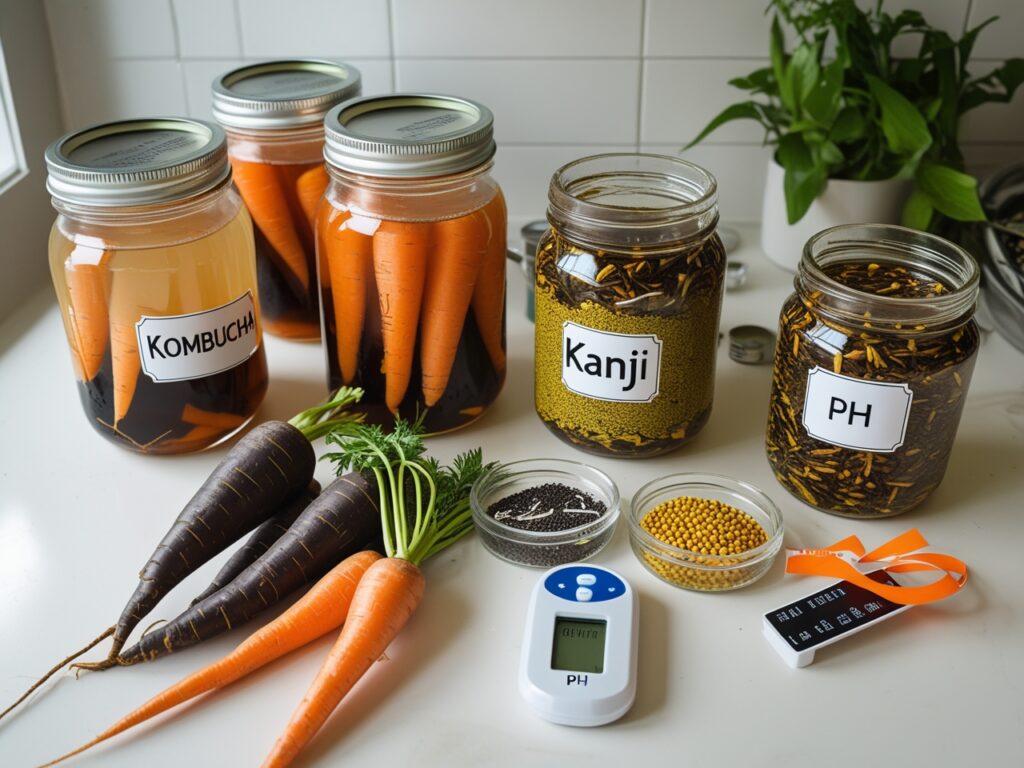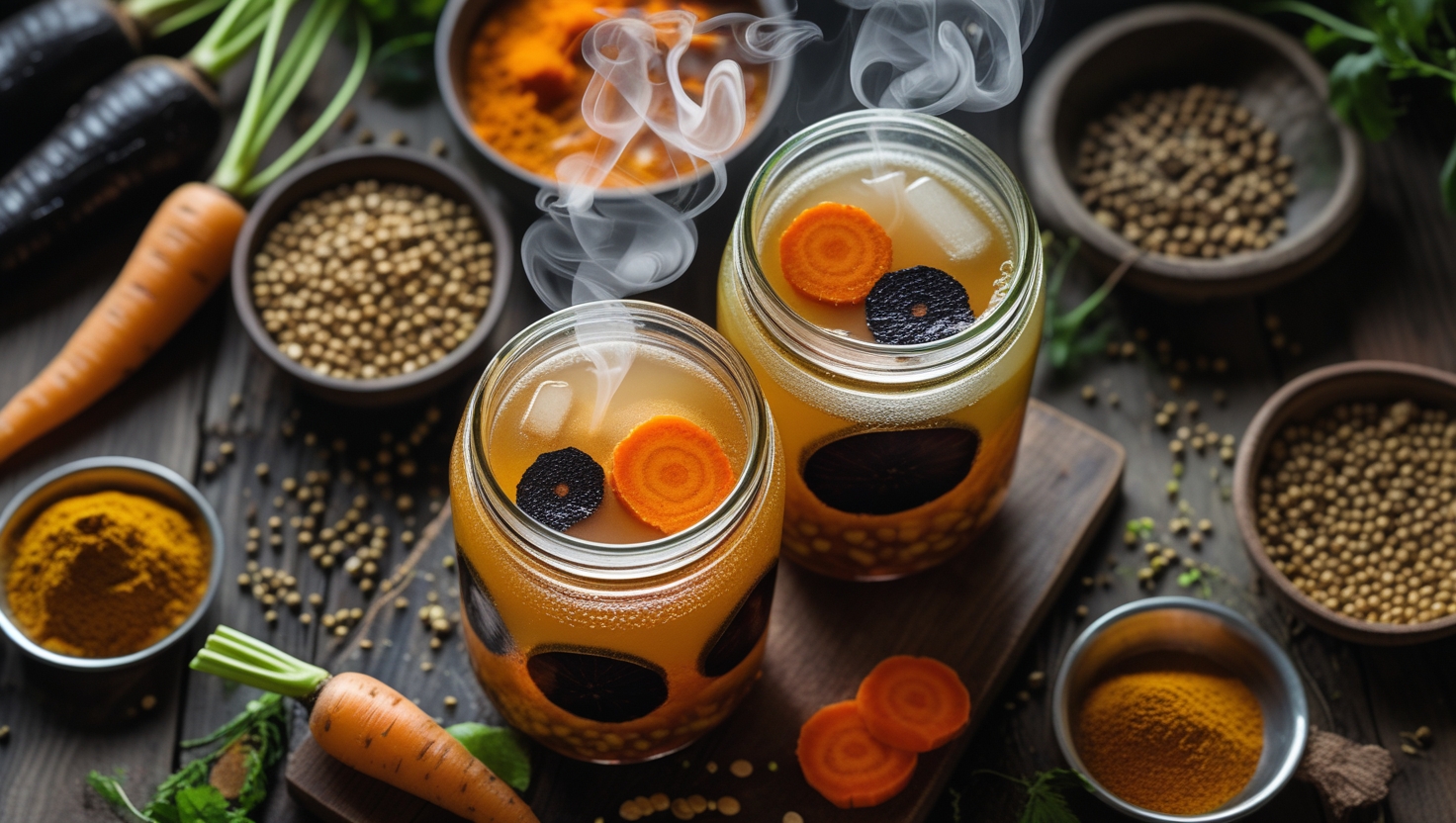The global love for probiotic drinks is brewing something new—where East meets further East. Kombucha, the fizzy fermented tea that’s a $4.26 billion global industry, now collides with kanji, India’s ancient spiced root ferment fusion. This potent marriage of microbes isn’t just a culinary curiosity—it’s a nutritional revolution. The result? A new category of fusion fermented beverages offering intensified health benefits, deeper ancestral wisdom, and future-forward biotech potential.
Kombucha Fermentation Benefits: Science Beyond the Hype
Kombucha’s rise from niche health stores to mainstream supermarket shelves isn’t without merit. Behind its effervescence lies a scientifically rich fermentation process involving a Symbiotic Culture of Bacteria and Yeast (SCOBY). In its first stage, yeast ferments the sugar into ethanol. In the second, bacteria oxidize the ethanol into acetic acid and other organic acids. The final brew contains polyphenols, B vitamins, trace alcohol, probiotics, and detoxifying compounds.
A unique player in kombucha’s microbial orchestra is Kluyveromyces marxianus, often peaking around Day 3. Studies suggest this yeast strain reduces harmful pathogens while enhancing probiotic populations, particularly in temperature-stable environments. This timeline also overlaps with maximum oxygen uptake, boosting enzymatic reactions that yield bioactive compounds.
One overlooked fact? Fermentation elevates kombucha’s polyphenol content by up to 40% compared to unfermented green or black tea. These antioxidants are critical in neutralizing free radicals, supporting cardiovascular health, and preserving skin elasticity by preventing collagen breakdown.
Another health angle lies in glucuronic acid, a by-product of fermentation. It binds to toxins and aids their excretion via the liver—a process known as glucuronidation. Many detox teas claim this benefit without the robust fermentation mechanism kombucha offers.
Fermentation also improves the bioavailability of minerals like magnesium, zinc, and iron. By breaking down anti-nutrients such as phytic acid, kombucha enhances your body’s ability to absorb micronutrients efficiently. That’s why this drink isn’t just trendy—it’s biologically transformational.
Fermented Kanji Drink: India’s Forgotten Superfood
If kombucha is the global poster child for gut health, kanji is India’s long-forgotten champion. With roots tracing back over 5,000 years, this fermented drink made from black carrots, mustard seeds, and spices was traditionally prepared during late winter—just in time for Holi.
During fermentation, kanji undergoes a significant biochemical transformation. The pH drops from around 6.8 to 3.4 by Day 6 or 7, making it inhospitable for pathogenic microbes. This acidic environment facilitates the growth of beneficial lactic acid bacteria (LAB), including Lactobacillus plantarum, which are known to improve digestion and strengthen the gut lining.
Black carrots, the base of kanji, are rich in anthocyanins—flavonoid pigments responsible for their dark hue. Fermentation breaks these complex molecules into more bioavailable forms, enhancing their antioxidant properties. Remarkably, kanji has shown up to 75% higher antioxidant activity post-fermentation, often outperforming synthetic antioxidant supplements in lab studies.
But kanji isn’t just a biochemical asset—it’s culturally embedded. Its preparation and consumption are part of a seasonal immune-boosting ritual in North Indian households. Mustard seeds, apart from initiating fermentation, add allyl isothiocyanate, which has antimicrobial and anti-inflammatory properties.
Kanji also serves as a powerful alkalizer, balancing internal pH levels when consumed regularly. Its spicy-tangy flavor not only excites the palate but also promotes bile secretion—crucial for digestion of fats. Yet in the rush toward Western health trends, kanji was nearly forgotten. Until now.
Kombucha and Kanji Fusion: The Science of Synergy
Imagine combining the bacterial richness of kanji with the yeast-laden complexity of kombucha. This is where modern fermentation science meets culinary innovation. Fusion fermentation isn’t about mixing drinks—it’s about blending microbial ecosystems to multiply health benefits.
One study comparing standalone kombucha and kanji to their fusion blend found that the hybrid beverage supported twice the probiotic diversity. That means more strains of beneficial microbes colonizing your gut, translating to better digestion, immunity, and metabolic regulation.

Microbial synergy: Fusion fermentation combines yeast and LAB for amplified probiotic benefits.
A striking example is Bazaar Rooh’s Batch #7. The brand experimented with a 70:30 kombucha-kanji blend using black carrot anthocyanins and oolong tea polyphenols. Their proprietary 72-hour fusion protocol reduced the alcohol content to below 0.4%, while preserving acidity and flavor complexity.
Interestingly, this 72-hour period isn’t arbitrary. It aligns with the optimal window for flavonoid stabilization. The final product retained 22.8 mg of quercetin equivalents per 100mL, a flavonoid known for its anti-inflammatory and cardiovascular benefits.
The interplay between yeast and LAB creates a dual-acid profile—acetic and lactic—which lowers spoilage risk and enhances flavor depth. This microbial harmony also allows for pH buffering, improving shelf stability without relying on artificial preservatives.
Fusion fermentation is proving to be more than the sum of its parts. It’s a new frontier in precision probiotic engineering, blending traditional wisdom with cutting-edge science.
Kombucha and Kanji Fusion Health Benefits

Fusion Fermented Beverages Deliver Superior Gut and Immune Health Compared to Kombucha and Kanji Alone
This fusion format amplifies existing kombucha fermentation benefits and builds on kanji’s ancestral bioactive compounds. Multiple strains of beneficial microbes colonize the gut more effectively, helping reduce symptoms of bloating, indigestion, and IBS.
Additionally, fusion beverages seem to adsorb heavy metals such as lead and cadmium more efficiently, thanks to the combined chelating properties of glucuronic acid and LAB exopolysaccharides.
Skin health is another surprise benefit. Several users reported clearer skin after two weeks of daily intake. The drink’s high antioxidant levels combat oxidative stress that leads to premature aging and inflammation.
Clinical researchers have also noted improved short-chain fatty acid (SCFA) production in the colon after fusion ferment consumption—particularly butyrate, which fuels colon cells and helps regulate blood sugar and cholesterol.
Market Trends in Fusion Fermented Beverages
As the wellness market grows more global, fusion fermented beverages are carving a distinct niche. In India, where local meets global, this niche is exploding. According to industry analysts, India’s kombucha sector is expected to clock a 17.6% CAGR from 2025 to 2030, much of it driven by urban consumers seeking science-backed traditional wellness.
Surveys show that 68% of Indian artisanal buyers now seek culturally hybrid drinks—ones that respect tradition but offer modern formats. This trend parallels the rise of Ayurveda-infused cold brews, ghee protein blends, and, yes, kanji-kombucha crossovers.
Yet, only 12% of beverage startups leverage kinetic fermentation modeling. These are mathematical simulations that predict microbial growth and compound retention across fermentation cycles. Brands that adopt such models optimize both taste and nutrition, gaining a competitive edge.
Startups like Bazaar Rooh and Fermentary Code are pioneering limited-edition batches where variables like temperature, inoculant ratio, and fermentation time are digitally monitored. These controlled experiments generate blends that are high in flavor consistency and low in spoilage risk.
Global investors are also taking notice. Fusion beverage startups in Southeast Asia and Europe are now sourcing Indian black carrots and mustard seeds—positioning kanji as the next global superdrink.
DIY Fusion: How to Make It at Home
Crafting your own kombucha and kanji fusion drink can be a joyful, healthful project. Here’s how to do it with precision:
Ingredients:
- Base: 70% kombucha SCOBY + 30% kanji starter (from a previous batch or mustard seed soak)
- Catalyst: 100g sliced black carrots, 500mL oolong tea (brewed and cooled)
- Sweetener: 3 tablespoons jaggery or raw cane sugar

Your probiotic journey starts at home: Setting up a kombucha-kanji fusion ferment safely and effectively.
Fermentation Protocol:
- Day 1–3: Keep at 25°C. Yeasts dominate. Stir daily.
- Day 4–6: Reduce to 20°C. LAB proliferation begins.
- Day 7: Taste and test pH (~3.4). Bottle and refrigerate to arrest fermentation.
Use sterilized glass jars and breathable cloth to prevent mold. Add crushed mustard seeds early to initiate kanji-specific bacteria. You can spice it up further with ginger or black pepper for a zing.
Flavor-wise, this drink balances the tang of kombucha with the earthiness of kanji. It’s less sweet than soda, more complex than tea, and refreshingly tart—especially when served chilled with a twist of lemon.
Consumer Voices: Real Testimonials
“The fusion drink eliminated my bloating—pure sorcery!” — Aarti S., Delhi, 2024
“Bazaar Rooh’s batch #7 nailed the spice-tang balance. It’s my go-to pre-workout now.” — Karan D., Mumbai, 2025
“My skin cleared up and my digestion improved in just ten days. This drink is magic.” — Sana P., Pune, 2025
“I was skeptical at first, but the fusion batch I brewed at home tasted amazing and lasted two weeks in the fridge.” — Rahul V., Bengaluru, 2025
Fermentation and Mental Health: The Gut-Brain Fusion Connection
The fusion of kombucha and kanji isn’t just about gut health—it could also be a secret weapon for the mind. With mental wellness becoming a top health priority, researchers are now paying close attention to the gut-brain axis—a powerful, two-way communication network between your digestive system and brain. This connection means what you drink can directly affect how you think and feel.
The Gut-Brain Axis: Your Second Brain Speaks
The human gut contains over 100 million neurons, earning it the nickname “the second brain.” This neural network communicates with your central nervous system through the vagus nerve, as well as through hormones, neurotransmitters, and immune system signals. About 90–95% of serotonin, the neurotransmitter responsible for mood regulation, is produced in the gastrointestinal tract—not the brain.
Disruptions in gut microbial balance (known as dysbiosis) have been linked to anxiety, depression, brain fog, and even sleep disturbances. That’s why scientists are now exploring how probiotics—especially those from fermented foods—can serve as natural psychobiotics, helping to restore mental balance by supporting microbial health.
How Fusion Fermented Beverages Impact Mental Health
Fusion fermented beverages like kombucha-kanji blends offer a wider spectrum of beneficial microbes than standalone ferments. Kombucha contributes yeast-derived compounds like ethanol and gluconic acid, which influence gut permeability and nutrient absorption. Kanji contributes potent lactic acid bacteria (LAB) like Lactobacillus plantarum and Lactobacillus fermentum, which have been shown to influence GABA (gamma-aminobutyric acid) levels—a neurotransmitter that calms the nervous system.
Together, these microbes help:
- Reduce cortisol levels (stress hormone)
- Increase serotonin availability
- Improve vagus nerve signaling
- Lower inflammatory cytokines, which are often elevated in depression and anxiety
A 2022 clinical study published in Frontiers in Nutrition found that daily consumption of a mixed-ferment beverage containing both LAB and yeast strains reduced anxiety scores by 35% in just 4 weeks. Participants also reported better sleep and improved focus.
Real-Life Benefits: Mood, Memory & Clarity
Anecdotal evidence is piling up too. Many fusion drinkers report not just digestive improvements, but also enhanced mental clarity and emotional stability. The effect isn’t instant—it builds over time, as the gut microbiota gradually rebalances and begins to influence brain chemistry.
“Since starting my fusion ferment routine, my morning brain fog has almost disappeared. I’m more focused, less irritable, and sleep like a baby.” — Alisha T., Chennai
Fermented black carrot compounds—rich in anthocyanins—also support mental health by crossing the blood-brain barrier and protecting neurons from oxidative stress. Meanwhile, kombucha’s acetic acid can help regulate blood sugar, another important factor in mood regulation.
Looking Ahead: Psychobiotic Fusion Potential
As interest in functional beverages grows, so does the opportunity to develop psychobiotic formulations—fermented drinks specifically designed to support mental wellness. Fusion formats could lead the charge, given their complex microbial landscapes and synergistic compounds.
Future possibilities include:
- Custom fusion drinks targeting sleep, anxiety, or focus
- Postbiotic additives (fermentation byproducts) that modulate brain inflammation
- AI-guided ferment recipes based on a user’s mood and microbiome profile
Key Takeaway
Mental health isn’t just in your head—it’s also in your gut. By drinking kombucha and kanji fusion, you’re not only nourishing your digestive tract but also potentially stabilizing mood, enhancing cognition, and reducing stress. It’s fermented wellness from the inside out.
Fermentation and Mental Health: The Gut-Brain Fusion Connection
The fusion of kombucha and kanji isn’t just about gut health—it could also be a secret weapon for the mind. With mental wellness becoming a top health priority, researchers are now paying close attention to the gut-brain axis—a powerful, two-way communication network between your digestive system and brain. This connection means what you drink can directly affect how you think and feel.
How Fusion Fermented Beverages Impact Mental Health
Fusion fermented beverages like kombucha-kanji blends offer a wider spectrum of beneficial microbes than standalone ferments. Kombucha contributes yeast-derived compounds like ethanol and gluconic acid, which influence gut permeability and nutrient absorption. Kanji contributes potent lactic acid bacteria (LAB) like Lactobacillus plantarum and Lactobacillus fermentum, which have been shown to influence GABA (gamma-aminobutyric acid) levels—a neurotransmitter that calms the nervous system.
Together, these microbes help:
- Reduce cortisol levels (stress hormone)
- Increase serotonin availability
- Improve vagus nerve signaling
- Lower inflammatory cytokines, which are often elevated in depression and anxiety
A 2022 clinical study published in Frontiers in Nutrition found that daily consumption of a mixed-ferment beverage containing both LAB and yeast strains reduced anxiety scores by 35% in just 4 weeks. Participants also reported better sleep and improved focus.
Real-Life Benefits: Mood, Memory & Clarity
Anecdotal evidence is piling up too. Many fusion drinkers report not just digestive improvements, but also enhanced mental clarity and emotional stability. The effect isn’t instant—it builds over time, as the gut microbiota gradually rebalances and begins to influence brain chemistry.
“Since starting my fusion ferment routine, my morning brain fog has almost disappeared. I’m more focused, less irritable, and sleep like a baby.” — Alisha T., Chennai
Fermented black carrot compounds—rich in anthocyanins—also support mental health by crossing the blood-brain barrier and protecting neurons from oxidative stress. Meanwhile, kombucha’s acetic acid can help regulate blood sugar, another important factor in mood regulation.
The Future of Kombucha and Kanji Fusion
The probiotic frontier is only beginning to unfold. Next-gen research is exploring engineered microbial cultures that push the limits of traditional fermentation.
What’s Next:
- CRISPR-Modified SCOBYs: Custom-engineered to produce vitamin B12, targeting deficiencies in plant-based diets.
- Zero-Waste Systems: Using spent kanji pulp to grow bacterial cellulose, later used in compostable packaging or even fashion textiles.
- Smart Fermentation Devices: IoT-enabled jars that monitor pH, temperature, and fermentation speed to reduce guesswork and enhance home-brew quality.
- Shelf-Stable Fusion Beverages: Research into postbiotics (non-living microbial metabolites) that retain health benefits even after pasteurization.
However, challenges remain. Around 93% of “fusion” drinks currently on shelves fail sensory testing, mostly due to poor microbial consortia and lack of pH balance. As biotech enters the kitchen, brands will need to combine traditional intuition with digital precision.
5 Takeaways to Sip On
- Double the Probiotics
Fusion drinks deliver more microbial strains than kombucha or kanji alone—boosting gut, skin, and immune health. - DIY with Precision
With the right starter, temperature, and timing, you can make a safe, delicious, science-backed fusion ferment at home. - Cultural Hybrid, Nutritional Powerhouse
Combining India’s kanji with East Asia’s kombucha brings together the best of both worlds. - Know What You Drink
Choose products that disclose pH, strain profiles, and fermentation time. Transparency ensures true health value. - Fusion Is the Future
With CRISPR SCOBYs and zero-waste pulp tech, fusion fermented beverages are not just drinks—they’re sustainable innovations.
Let your gut lead the way. The next time you sip a probiotic drink, make it one that respects tradition, embraces science, and delivers results. The age of kombucha and kanji fusion is here—and it’s just getting started.
